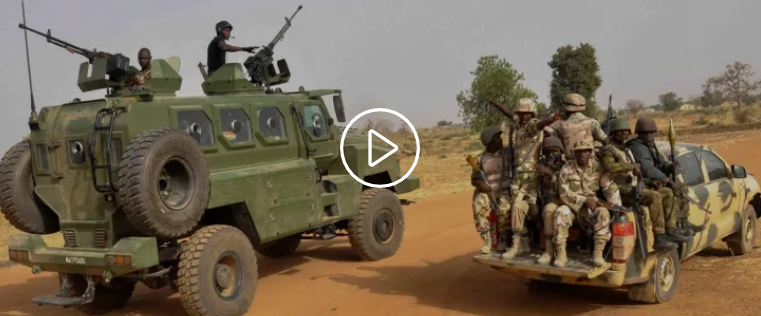[By Idowu Faleye: +2348132100608]
In continuation of part 1 of this article, it’s important to delve deeper into the Trend of Insecurity in Nigeria and the inability of the Nigerian government to take decisive action.
For over a decade, Nigeria has grappled with escalating security challenges, primarily driven by the Boko Haram insurgency, banditry in the northwestern region, and violent conflicts between Fulani herdsmen and farmers. Despite these well-documented threats, successive administrations have failed to address them effectively.
It begs the question: Why hasn’t there been a comprehensive national response? One glaring answer is the lack of strong political will to curb insecurity, coupled with the absence of technological solutions that could provide a better means to tackle the problem. While military operations against the group have occasionally intensified, inconsistency in government action and the lack of sustained offensives reveal a dangerous gap in the country’s counterinsurgency strategy.

Take, for example, the infamous $2.1 billion arms procurement scandal that surfaced during President Goodluck Jonathan’s administration. Instead of procuring weapons and strengthening military operations, the funds were mismanaged, leaving soldiers ill-equipped to fight Boko Haram. This scandal epitomizes the depth of corruption in Nigeria’s defense sector. Amazingly, a bill was recently proposed to curb the diversion of military funds, yet members of the Senate vocally opposed it, demonstrating a blatant disregard for national security.
The lack of modern intelligence-gathering technology further compounds the issue. Nigeria continues to rely on outdated military hardware, with minimal use of surveillance drones or satellite technology to monitor Boko Haram’s movements. Meanwhile, insurgent groups have adapted to modern warfare tactics, making Nigeria’s inadequate response even more glaring.
Read Also: The Trend of Insecurity in Nigeria. [Part 1]
Banditry has become one of the most potent threats to national security in Nigeria. These armed groups are notorious for kidnapping for ransom, attacking villages, and forcing thousands to flee their homes. Yet, the government’s response has often been inconsistent. In certain states like Zamfara and Katsina, bandits have been offered amnesty—a controversial tactic that critics argue emboldens criminals rather than deters them.
In 2021, the National Security Tracker recorded that over 2,700 people died from bandit-related violence in northern Nigeria. The decision to negotiate with bandits reflects the lack of political will to fight these criminals decisively. Instead of eradicating them through military action or cutting off their funding, the government has chosen the path of least resistance, worsening the insecurity.

Moreover, allegations of political patronage continue to taint efforts to end banditry. Local politicians have reportedly used bandits to intimidate opponents or gain support in rural areas. In fact, a well-known bandit leader was recently offered a political appointment in one of the northern states. This not only undermines the fight against crime but also erodes the public’s trust in the government.
The violence between Fulani herdsmen and farming communities in Nigeria’s Middle Belt region has resulted in thousands of deaths and displacement of entire communities. However, successive governments have been reluctant to take decisive action against these herdsmen, largely due to ethnic and political biases.
Read Also: The Undefined System of Government in Nigeria: A Call for True Federalism
In states like Benue and Plateau, thousands of farmers have been killed with minimal government intervention. The cyclical nature of these violent clashes points to the government’s failure to address the root cause: competition over land and resources. The complicity of federal and state governments in the Fulani herdsmen crisis is evident in their inability to arrest and prosecute perpetrators of violence. A Human Rights Watch report highlighted that despite hundreds of violent clashes, very few herdsmen have been brought to justice.
While the Nigerian government continues to struggle with security challenges, other countries have leveraged advanced technology to combat crime effectively. The adoption of modern surveillance systems, artificial intelligence (AI), and data analytics could revolutionize Nigeria’s approach to national security. Here are a few examples of how technology can be applied:
![The Trend of Insecurity in Nigeria. [Part 2]](https://ephraimhilldc.com/wp-content/uploads/2024/09/Drone.png)
Drones for Surveillance: In combating Boko Haram, drones equipped with thermal imaging could be deployed to monitor remote areas like the Sambisa Forest, where insurgents often hide. This would enable the military to gather real-time intelligence and conduct precision airstrikes with minimal civilian casualties.
Satellite Monitoring: Satellite imagery and geospatial technologies are critical for tracking insurgents’ movements across borders. These technologies provide real-time data that can disrupt supply chains and monitor the activities of Boko Haram and bandits across the Sahel region.
Cybersecurity and Social Media Monitoring: Cybersecurity units could intercept financial transactions linked to these groups, cutting off vital sources of funding. Additionally, Terrorist organizations use social media for propaganda. AI-powered tools could track these communications and prevent the spread of harmful content.
Geofencing and GPS Technology: To address the Fulani herdsmen crisis, GPS-based geofencing technology could help designate grazing areas for herders, ensuring that they do not encroach on farmland. Real-time alerts would notify authorities if herders cross into farming territories, allowing for swift intervention before violence erupts.
![The Trend of Insecurity in Nigeria. [Part 2]](https://ephraimhilldc.com/wp-content/uploads/2024/09/GeoFencing.png)
Mobile Reporting Platforms: In rural areas prone to bandit attacks, mobile apps could be developed to allow villagers to report suspicious activities or imminent threats. This would help security forces respond more rapidly to crises in isolated communities.
The failure to address these security challenges is not just a matter of loss of lives; it threatens the very fabric of Nigeria’s unity and economic stability. As the insecurity spreads, regional separatist movements, such as those led by the Indigenous People of Biafra (IPOB) in the Southeast, gain momentum. The calls for secession are driven in part by the belief that the federal government has failed to protect its citizens.
Read Also: The Hidden Margins Between Politics and Governance in Nigeria
In addition, the ongoing violence has severely disrupted agriculture and trade in key regions, including the North and the Middle Belt, where a significant portion of Nigeria’s food supply is produced. The Food and Agriculture Organization (FAO) warned in 2022 that Nigeria faces a looming food security crisis due to the displacement of farmers and the destruction of crops by armed groups. If this trend continues, the economic repercussions could be catastrophic, pushing inflation higher and driving millions into poverty.
Foreign investors, already wary of Nigeria’s political instability are pulling out of key sectors such as agriculture, energy, and infrastructure. According to a 2022 report by the World Bank, Nigeria’s foreign direct investment (FDI) dropped by 33% between 2019 and 2021, largely due to insecurity.
Read Also: African Poverty is Not an Act of God
Nigeria is at a crossroads. The escalating security crisis, if not addressed with urgency, has the potential to destabilize the nation and lead to widespread civil unrest. The lack of political will is glaring, but there is still time to reverse the trend. By adopting modern technological solutions and demonstrating a firm commitment to ending corruption and mismanagement in the security sector, Nigeria can begin to restore peace and rebuild national unity.
The Nigerian government’s decisive action will determine whether Nigeria remains a united and stable country or succumbs to the forces threatening to tear it apart. Now is the time for leaders to act decisively, and for all Nigerians to demand accountability from their government.
References:
SB Morgen Intelligence. (2021). Nigeria Security Tracker 2021 Report.
Human Rights Watch. (2022). World Report 2022: Nigeria.
Food and Agriculture Organization (FAO). (2022). Nigeria: Food Security and Nutrition.
World Bank. (2022). Nigeria: Foreign Direct Investment Report.
Gideon, J. (2021). The Politics of Banditry in Northern Nigeria.
Olukoya, A. (2020). The Impact of Boko Haram Insurgency on Nigeria’s Economy. African Economic Review, 15(4), 45-62.
Nigerian Defence Academy (NDA). (2023). Annual Defence Review: A Report on Nigeria’s Military Capabilities.
Chukwuma, I. (2022). Technological Innovations for Security in Nigeria.
Adamu, M. (2022). The Fulani Herdsmen Crisis: Analysis and Recommendations.
Bello, S. (2021). Government and Corruption in Nigeria’s Security Sector.
Born in Ekiti State, Nigeria, Idowu Faleye is a Policy Analyst and IBM-certified Data Analyst with an academic background in Public Administration. He’s the Lead Analyst at EphraimHill Data Consult and the Publisher of EphraimHill DataBlog, which posts regular topics on issues of public interest. He can be reached via WhatsApp at +2348132100608 or email at ephraimhill01@gmail.com
© 2024 EphraimHill DC. All rights reserved.This article is the intellectual property of EphraimHill DataBlog. For permission requests, please contact EphraimHill DC at ephraimhill01@gmail.com.


![The Trend of Insecurity in Nigeria. [Part 2]](https://ephraimhilldc.com/wp-content/uploads/2024/09/Computer-Monitoring-of-Remote-areas.png)












































































